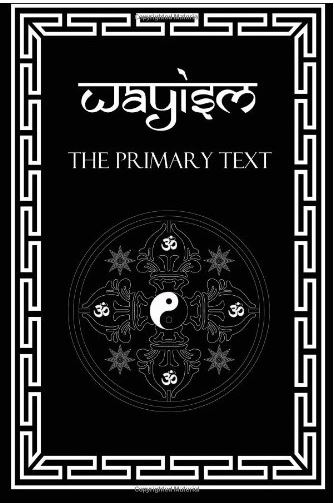The Book Wayism
About the book Wayism
The book WAYISM is the quintessential source book for Wayist scholars and teachers. It is a restatement of Wayist truth for the present day. It was compiled from contributions of an international panel of Wayist scholars, edited by +Yajn (Jean du Plessis).

What the book is NOT
• The book is not a feel-good ego-pumping read
• The book is not written in narrative-style and does not tell a story
• The book is not an academic, or scientific discussion or thesis
What the book IS
The book is written in easy language.
Part One explains the ontology of life as it pertains to humans. It explains what we can know about the One, the Source of all and the divine energies active in the universe(s) that affect our lives. Chapter by chapter, it speaks to the metaphysical laws of the universe as it pertains to human beings.
Part Two of the book is a friendly reading about the Wayist lifestyle, ethics and our understanding of the meaning of important events on the soul's path to fulfilling it purpose.
The text is permeated with several layers of understanding
Souls at different levels of development get different teaching from the text. Read the same text later, and you learn something different. It has staying power that will last more than one lifetime. Remember to take it with you when you leave, but its OK with us if you buy another book next time you come around.
Get your copy "Wayism: Primary Text" from Amazon.com
Who should read the book
We need the money so everyone should buy at least one!
No, the truth is, teachers and group leaders of Wayist groups must read it. Anyone can become a well-informed fully-fledged Wayist by going through this web site and associating with others in the Online Sangha.
Wayism is really simple. We can state all of Wayism in less than 200 pages in one book. Christianity cannot be properly comprehended even after studying it at seminary level for many years (this author's personal experience) and even then there are thousands of schools of thought about it. Buddhism can get very intricate, with its thousands of levels of heavens and hundreds of thousands Buddhas and ever increasing terminology. Simplicity is important for Wayists. Our dear brothers and sisters from the Buddhist and Taoist religions of course tease us by saying of us, "simple minds need simple things". We must agree that they have a point. We respect the limitations of the human body-mind.
What to look out for; if the reader is used to reading books about spirituality
Take care not to gloss over definitions of terms that you are used to reading about, thinking that all definitions are equal.
One example will suffice:
KARMA. Most, if not all present-day spiritual regimes define karma as a type of punishment. Wayists dont understand that to be so because that argument leads one to speak of the Divine One as if an antropomorphic God (God has human qualities, needs, emotions) with a need to punish people, which leads to considerations of "Divine wrath." Wayists do not agree with that at all. For us, Karma is a law of nature (as gravity, for example). Karma regulates our curricilum in this school of learning to fulfil the purpose of human life. It simply computes that if we err, then we need to be presented with another lesson on that subject so we can learn to not make that mistake again. Karma, for us, is nothing more than a metaphysical law of being.
Another way in which Wayist understanding differs from others in this regard is of so-called "good karma". We don't believe in bad karma, and therefore also not in good karma. The school of life is not the type of college where you can accumulate points working hard on one subject, and then cash in those points toward graduation in courses you suck at. We have to learn to "become perfect as our Father in Heaven is perfect", that is, perfect spiritual beings. We can only succeed in the purpose of life when we have accumulated sufficient wisdom of the human state. And, that is not done by performing well in good works of some kind but we fail in bad works of another kind.
